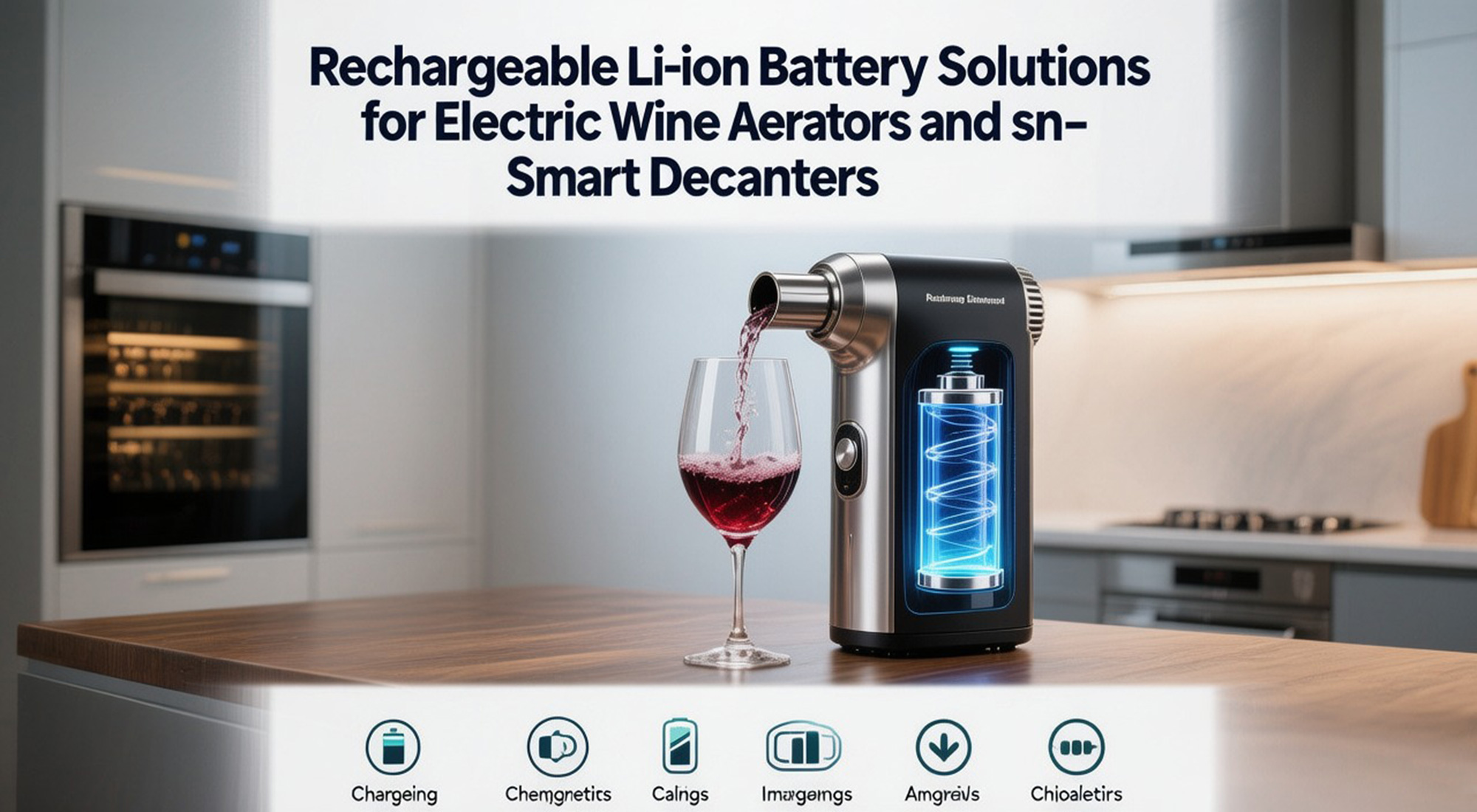
Rechargeable Li-ion Battery Solutions for Electric Wine Aerators and Smart Decanters
How compact Li-ion battery packs power smooth, quiet, and long-lasting performance in electric wine aerators and smart decanters.
1. Electric Wine Aerators & Smart Decanters: Why the Battery Matters
Electric wine aerators—also known as smart decanters or automatic wine breathers—have become increasingly popular among
home users, wine enthusiasts, and restaurants seeking to elevate wine serving experiences. These devices enhance flavor
and aroma by oxygenating wine instantly, eliminating the traditional 30–60 minutes of decanting time. And at the heart of
every high-performance aerator lies a stable, safe, and compact rechargeable lithium-ion battery pack.:contentReference[oaicite:0]{index=0}
As a specialized supplier of custom Li-ion battery solutions, PKNERGY helps manufacturers design reliable power systems
for portable wine aerators that require smooth pump operation, long usage time, and consistent performance. This article
explains why rechargeable Li-ion batteries are ideal for electric wine aerators, what technical factors matter, and how
PKNERGY supports OEM/ODM brands in bringing premium products to market.
2. Why Rechargeable Li-ion Batteries Are the Best Option
Electric wine aerators typically operate using a micro-air pump or diaphragm pump that pushes air into the wine stream,
accelerating oxidation and improving taste. These pumps require:
- Stable and clean power output
- Quick start-up response
- Low noise with smooth motor operation
- Compact, lightweight battery integration
- Long usage cycles for hospitality and consumer needs
Weak or unstable batteries often lead to motor vibration, reduced airflow and inconsistent aeration, short runtimes,
overheating, and poor user experience.:contentReference[oaicite:1]{index=1}
Rechargeable lithium-ion cells solve these limitations by offering high energy density, excellent current delivery, and
long cycle life. In electric wine aerators, manufacturers commonly adopt:
- Single-cell Li-ion (3.7 V) with boost circuit
- 2S Li-ion packs (7.4 V) for higher torque motors
- Compact Li-ion pouch cells for slim, elegant designs
For projects requiring higher safety margins and longer cycle life, PKNERGY can also evaluate
custom LiFePO4 battery
solutions while keeping the product’s compact design.
3. Typical Battery Configurations in Wine Aerators
Based on the original device design and motor power, common battery pack structures in wine aerators include::contentReference[oaicite:2]{index=2}
- 1S (3.7 V) with boost converter – Ideal for small, compact aerators where form factor is critical.
- 2S (7.4 V) Li-ion pack – Used when the pump motor requires greater torque or stable higher voltage.
- 3.7 V Li-ion pouch cell – Enables ultra-slim or curved designs for premium smart decanters.
Most wine aerators operate at around 1–2 A peak for pump startup. PKNERGY can optimize cell selection and pack structure
to ensure low internal resistance and stable output under these loads.
4. Key Technical Considerations for Manufacturers
When designing a new electric wine aerator or upgrading an existing one, battery system design should consider:
- Compact size & aesthetic integration – Battery must fit into slim handles or base stands without affecting appearance.
- Low-noise power output – Stable voltage and current help the pump run smoothly, reducing vibration and noise.
- USB / Type-C charging compatibility – Users expect convenient charging via standard USB or USB-C adapters.
- Safety and protection – Over-charge, over-discharge, short-circuit, and temperature protection via BMS.
- Compliance requirements – UN38.3, MSDS, IEC 62133 (optional) for logistics and market access.:contentReference[oaicite:3]{index=3}
For brands that plan to integrate the aerator into a wider smart-kitchen ecosystem, PKNERGY can also provide communication-enabled
BMS options for battery status monitoring.
5. PKNERGY’s Li-ion Battery Solutions for Electric Wine Aerators
PKNERGY offers a complete portfolio of customized lithium-ion battery solutions specifically for electric wine aerators,
smart decanters, and related small appliances:
5.1 Custom Li-ion Packs
We design 1S and 2S Li-ion packs using cylindrical or pouch cells, tailored to your voltage, capacity, current, and runtime
requirements. Cell brands and specifications are selected according to your cost and performance targets.
5.2 Rechargeable Modules with Integrated BMS
Each pack integrates a carefully designed protection board (BMS) that includes over-charge, over-discharge, over-current, and
short-circuit protection. We can also add fuel gauge ICs for more accurate battery level indication.
5.3 USB / USB-C Charging Modules
PKNERGY engineers support charging circuit design for USB or USB-C ports, ensuring safe charging currents and compatible
user experience with standard adapters and power banks.
5.4 Mechanical & Structural Customization
From pack dimensions and lead-wire length to connectors and fixing brackets, we work closely with your structural design team
to ensure the battery module fits perfectly into your aerator or decanter housing.
5.5 Complete Certification Support
We assist with UN38.3, MSDS, transportation identification reports, and, where needed, IEC 62133 testing. This helps you
ship products globally with fewer delays and risks.
5.6 OEM / ODM Support
Whether you are an established brand or launching a new smart wine accessory, PKNERGY provides OEM/ODM services from prototype
to mass production. Our experience in
custom lithium polymer battery
design and
consumer electronics power solutions
helps shorten your development cycle and improve product reliability.
6. FAQ: Battery Design for Wine Aerators
Q1: How long can an electric wine aerator run on a single charge?
Runtime depends on the battery capacity, pump power, and working mode (continuous vs. intermittent). For example, a 3.7 V
1200–2000 mAh pack can typically support dozens of aeration cycles in a home-use scenario. PKNERGY can help you simulate
real usage and select the most suitable capacity.
Q2: Should I choose a 1S or 2S Li-ion pack?
For compact, low-power pumps, a 1S Li-ion pack with a boost converter is often sufficient and keeps the system simple.
For motors that need more torque or where efficiency is critical, a 2S (7.4 V) pack may be more appropriate. Our engineers
can recommend the best architecture based on your motor specifications and mechanical space.
Q3: Can the same battery platform be used across multiple smart kitchen devices?
Yes. Many brands standardize on a small set of Li-ion pack platforms and reuse them across wine aerators, grinders, frothers,
and other kitchen tools. PKNERGY can help you design a modular battery platform and align it with your
consumer electronics power solution
roadmap.
Q4: What documents are required for shipping wine aerators with built-in batteries?
Generally, UN38.3 test reports, MSDS, and transportation identification reports are needed. For some markets or channels,
IEC 62133 safety certification may also be required. PKNERGY can guide you through the entire process and provide
relevant reports for your logistics partners.
7. Contact Miah — PKNERGY
If you are developing or upgrading an electric wine aerator or smart decanter and need a custom battery solution,
PKNERGY’s engineering team is ready to support you from concept to mass production.
Contact Person: Miah (崔娟)
Email: sale@pknergy.com
Phone / WhatsApp: +86 139 0246 3897
Website: https://pknergybattery.com
You can also submit your project details on our
Contact Us
page to get a quick quotation and technical evaluation.

